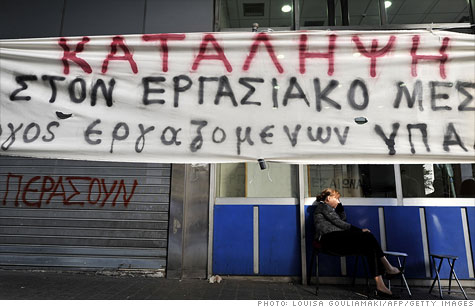Search News

An employee sits by the occupied Ministry of Finance in Athens by a banner which translates as 'Occupation' on September 30, 2011
NEW YORK (CNNMoney) -- It was once unthinkable but is now widely expected: Greece is headed toward default.
Not if -- but when.
"A default is likely," said Wolfango Piccoli, director of the London office of the Eurasia Group. "At this stage, the question is about the timing."
The timing is important because European authorities are scrambling to build a "firewall" that will protect banks and other euro area nations from the fallout of a Greek default.
The first step is to overhaul an existing bailout fund for Europe, which is expected to be officially approved by all 17 eurozone nations by the end of October.
The goal, analysts say, is to create conditions for Greece to default in an organized way, rather than an abrupt collapse that could cause chaos in global financial markets.
Euro area officials have said repeatedly that Greece will meet its obligations and avoid a default. Yet the inevitability of a Greek default has become conventional wisdom in financial circles.
"The debt level of Greece is not sustainable," said Farid Abolfathi, senior director of the Risk Center at IHS Global. "No matter how much austerity, they will not be able to pay their creditors. At some point in time, they are going to default."
The argument is that Greece owes more money than it can realistically repay, considering that its economy has been in recession for years and is not expected to turn around any time soon.
For the past 15 months, Greece has been kept afloat by billions of euros in bailout money from the International Monetary Fund and its European "partners."
But the nation has had limited success when it comes to enacting the painful reforms necessary to bring down its budget deficits, and has yet to begin the process of restructuring its bloated public sector.
The Greek government disclosed over the weekend that it will not meet its budget goals this year and next, citing a worse-than-expected economic environment.
The shortfall, while not a surprise, has complicated the politically fraught negotiations over the latest €8 billion installment of emergency funding for Greece from last year's €110 billion bailout.
For one thing, the nations providing the bailout money are having a hard time convincing taxpayers that supporting Greece is absolutely necessary. There is limited political appetite in places like Germany, Austria and Finland for an open-ended commitment to a nation that did not manage its finances very well.
At the same time, there is evidence to suggest that the reforms Greece must make to qualify for its bailout money will only push its economy deeper into recession.
The nation is also facing an increasing political backlash in the form of protests and strikes in Athens. A one-day general strike got underway Wednesday morning. The halting progress has also raised questions about a plan to provide a second €109 billion bailout for Greece.
"This discussion about a second Greek bailout could easily morph into a debate about an orderly Greek default," said Holger Schmieding, chief economist at Berenberg Bank. "This discussion is likely to start in earnest in mid-October and come to a head before the next tranche for Greece is due in December."
As part of the proposed second bailout, banks and private sector investors agreed to take a 21% writedown on the face value of the Greek bonds on their books.
But there is now widespread speculation that bondholders may need to accept "haircuts" of up to 50% in order for Greece to recover. That would represent a significant liability for the European banking sector, which is already seen as woefully undercapitalized.
The threat of a banking crisis is one of the main reasons why euro area politicians have pledged to do whatever it takes to prevent a Greek default.
In addition, officials in Europe are afraid a messy default would lead to a so-called debt contagion that would undermine larger economies such as Italy.
Euro area governments are expected to unanimously approve a proposed expansion of the European Financial Stability Facility by the end of October. The revamped bailout fund will have greater flexibility to intervene in sovereign debt markets and provide financing for troubled banks.
But many analysts say governments will need to pony up much more cash in order for the €440 billion fund to be effective. Euro area officials have said they are working on ways to "enhance" the funds lending capacity, while ruling out an increase in its price tag.
"At some point, they will have to cough up the money that is required," said Abolfathi. "There's a need for a big and credible fund so that markets don't bet against these countries and banks."
In the meantime, there are still serious questions about what a Greek default would mean. No euro area nation has ever defaulted, and analysts say a break up of the 12-year old currency union cannot be ruled out.
At the same time, it's not clear what Greece could do to boost its economic competitiveness after it defaults.
A government-fueled recovery seems unlikely, given that Greece would have difficulty borrowing money in the public market. Even after a default, Greece may be dependent on outside support for years to come. ![]()
| Overnight Avg Rate | Latest | Change | Last Week |
|---|---|---|---|
| 30 yr fixed | 3.80% | 3.88% | |
| 15 yr fixed | 3.20% | 3.23% | |
| 5/1 ARM | 3.84% | 3.88% | |
| 30 yr refi | 3.82% | 3.93% | |
| 15 yr refi | 3.20% | 3.23% |
Today's featured rates: